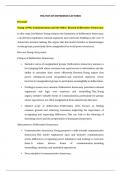POLITICS OF DIFFERENCE LECTURES
Perusall:
Young (1996) Communication and the Other: Beyond Deliberative Democracy
In this essay, Iris Marion Young critiques the limitations of deliberative democracy,
a model that emphasizes rational argument and consensus-building as the core of
democratic decision-making. She argues that this model excludes or disadvantages
certain groups, particularly those marginalized by social power structures.
Here are Young's key points:
Critique of Deliberative Democracy:
Excludes voices of marginalized groups: Deliberative democracy assumes a
level playing field where everyone has equal access to information and the
ability to articulate their views effectively. However, Young argues that
power imbalances, social inequalities, and historical injustices create
barriers for marginalized groups to participate meaningfully in deliberation.
Privileges reason over emotion: Deliberative democracy prioritizes rational
arguments and logic over emotions and storytelling. This, Young
argues, excludes valuable forms of communication, particularly for groups
whose experiences are often marginalized from mainstream discourse.
Limited scope of deliberation: Deliberation often focuses on finding
common ground and achieving consensus, neglecting the importance of
recognizing and respecting differences. This can lead to the silencing of
dissenting voices and the perpetuation of dominant perspectives.
Alternatives to Deliberative Democracy:
Communicative democracy: Young proposes a shift towards communicative
democracy. This model emphasizes open and inclusive communication
across differences, recognizing power imbalances and seeking to overcome
them. It values diverse forms of communication, including
storytelling, emotions, and embodied experiences.
Five principles of communicative democracy:
, o Inclusion: All voices must be heard and respected, regardless of
power or social position.
o Power-sharing: Deliberative processes must actively address power
imbalances and create conditions for equal participation.
o Diversity: A wide range of perspectives and experiences should be
incorporated into deliberation.
o Decentering reason: Recognize the value of diverse forms of
communication, including emotions and storytelling.
o Commitment to social justice: Deliberation should aim to address
social inequalities and promote justice for all.
Recognizing difference and power dynamics: Deliberative models often assume
participants are equal and have equal access to information and resources. Young
argues this ignores the reality of power imbalances based on race, class, gender,
and other factors, which can silence marginalized voices.
2. Valuing diverse forms of communication: Deliberation often prioritizes
rational arguments and logic, neglecting the role of emotions, storytelling, and
other forms of expression. Young argues these diverse forms are crucial for
understanding lived experiences and fostering empathy.
3. Addressing social injustice: Deliberative models primarily focus on reaching
consensus on policy issues, overlooking the need to address underlying social
injustices that create inequalities in the first place. Young argues communication
should be used to challenge power structures and advocate for social change.
4. Inclusivity and accessibility: Deliberative processes often require specific
skills and resources (e.g., time, literacy) that can exclude marginalized groups.
Young calls for inclusive structures that are accessible to diverse voices and
perspectives.
5. Beyond consensus: Young argues that focusing solely on reaching consensus
can stifle dissent and critical thinking. She proposes a more dynamic model of
,communication that allows for respectful disagreement and exploration of
different perspectives.
Bennet and Livingston (2020) A brief History of the Disinformation Age:
Information Wars and the Decline of Institutional Authority
Key points:
Long-term erosion of trust: The book argues that the erosion of trust in
institutions like media, science, and government is not a recent
phenomenon, but has been building for decades through targeted efforts by
political and business interests.
Disinformation as a weapon: The book explores how different
actors, including politicians, corporations, and foreign governments, have
weaponized disinformation to manipulate public opinion, undermine
opponents, and advance their own agendas.
Technology as an amplifier: While disinformation has always existed, the
rise of social media and digital platforms has dramatically amplified its
reach and impact, making it more difficult to combat.
Focus on the US, but global implications: Though primarily focused on
the US, the book acknowledges the global significance of these trends and
their impact on democracies around the world.
The book is structured in two parts:
Part I: Provides a historical overview of disinformation campaigns and
institutional decline, exploring cases from the Cold War to the present day.
Part II: Features contributions from various scholars who delve deeper into
specific aspects of the problem, including:
o The political economy of disinformation.
o The role of emotions and social media in its spread.
o Historical roots of disinformation campaigns.
o Policy challenges and potential solutions.
, Central Argument: The "disinformation age" didn't emerge suddenly. It's the
culmination of decades-long efforts by political and business interests to
undermine trust in institutions like parties, elections, media, science, and civil
society. These efforts, fueled by technological advancements and strategic
manipulation, have eroded the foundations of democratic information
environments.
Key Themes:
Historical Roots: The book traces the roots of disinformation back to the early 20th
century, highlighting how powerful actors used propaganda to sway public opinion
and advance their agendas. It examines cases like the National Association of
Manufacturers' campaign promoting free enterprise and the Koch brothers'
network using misinformation to thwart democracy.
Erosion of Trust: The authors argue that decades of attacks on institutions have led
to a widespread decline in trust, making individuals more susceptible to
misinformation and manipulative communication. This fosters cynicism and
polarization, hindering democratic processes.
Role of Technology: While technology has democratized information access, it has
also facilitated the spread of misinformation. The book explores how social media
platforms, algorithms, and echo chambers contribute to the problem.
Disruptive Communication: Beyond "fake news," the authors focus on "disruptive
communication," which aims to generate online chaos and undermine public
discourse through emotional manipulation, conspiracy theories, and attacks on
truth itself.
Policy Challenges: The book concludes by addressing the complex challenge of
addressing misinformation without infringing on freedom of speech. It proposes
potential solutions like media literacy initiatives, platform regulation, and
supporting independent journalism.





